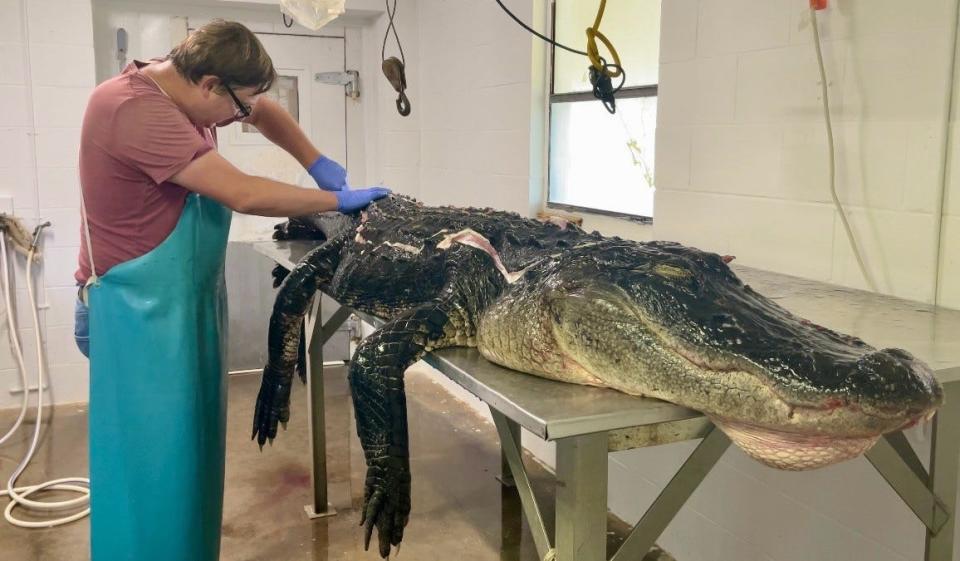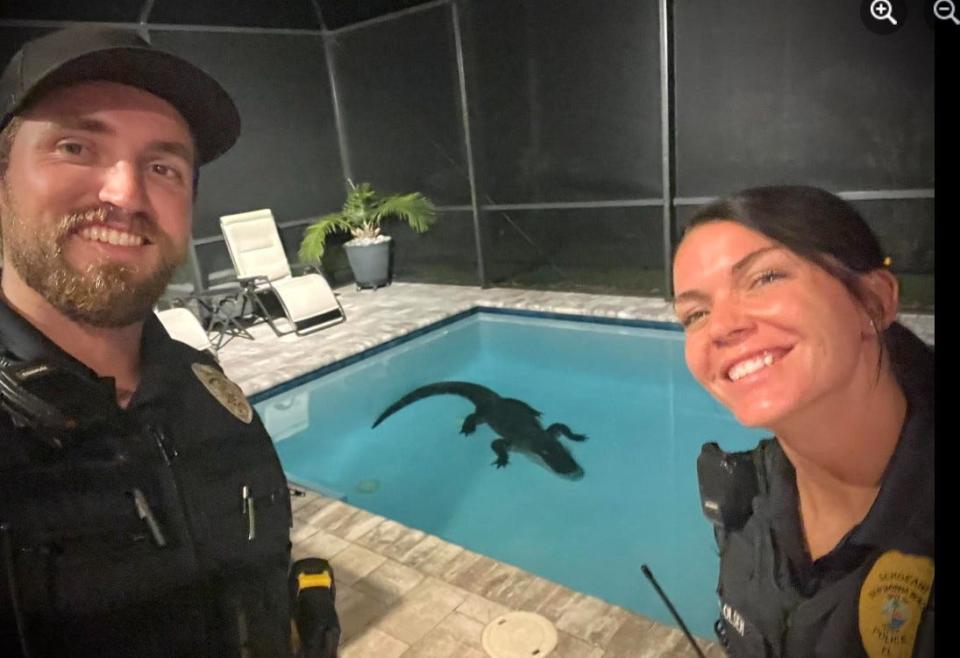'Best white meat there is': Pierson gator trapper estimates he's caught 10,000 in 36 years
PIERSON - When an alligator crashed through the screen fence of a swimming pool at a Venetian Bay home in New Smyrna Beach in May and took a nighttime dip, state-licensed trapper Curtis Lucas was called to remove the reptile.
The resident had "a 10-foot alligator in his swimming pool," Lucas recalled during an interview at his alligator meat processing plant.

And when a 9-foot 1-inch alligator killed a bulldog at a waterfront home on Kendrew Drive near Skylake in Port Orange in April 2016, Lucas was called again. The pet owner was also concerned about a massive, 11-foot 5-inch male weighing around 300 pounds in the area.
So Florida Fish and Wildlife officials asked Lucas to get rid of that one too.
Catching nuisance alligators for 36 years
Lucas, 65, born and raised in the Pierson area, said he has been catching nuisance alligators for more than three decades. When residents in Volusia, Flagler, Putnam and part of Lake counties express fear of alligators that come too close to them, their children, or eat their pets, they notify wildlife officials.
This usually means that the gators lose their fear of humans and are considered dangerous, Lucas said.
FWC then calls the state-licensed alligator trapper for the area where the complaint was made, and no matter what time they get the call, they have to respond, Lucas said.
Lucas's territory extends from State Road 44 north to the St. Johns County line. His western borderline is the St. Johns River and the coast on the east.
"I was hired by the state to be a nuisance trapper. I've been trapping nuisance alligators for about 36 years. So, I should know a thing or two about gators," Lucas said, laughing when asked how much he knows about the scaly beasts.
When Lucas started working for the state, there were only about 30 trappers. Today there are more than 100 in Florida, he said.
Right pick for the job
Gray Leonhard, a Pierson native and a former FWC officer, who worked for the state agency for almost 30 years, said he is familiar with Lucas and his family and considers him to be an excellent trapper.
Leonhard was the area supervisor for the St. Johns River corridor and said Lucas is very familiar with the area he works as he was a guide for years at a lodge and fish camp in Astor, which his parents owned.
"Curtis used to guide people fishing, he knows about boating and the wildlife," Leonhard said. "He is the perfect pick for the job."
As the population of Florida grows, communities are built closer to where alligators live. And with a large gator population, people are more likely to encounter the animals, so trappers like Lucas play an important role, he said.

"We've had many instances where alligators have bitten people, we've had instances where alligators have killed people, and there are a lot of instances where alligators capture people's pets, mostly dogs, and any pet that gets near the water," Leonhard said.
In the 1970s, nuisance alligators were trapped by FWC officers and relocated to remote areas, which are becoming less available with the population growth, Leonhard said. That's not the case today.
"There is a need for people who trap the nuisance alligators and Curtis fills that spot quite well," he said.
'That's a capture'
Recently, a News-Journal reporter tagged along with Lucas for several days to learn what it takes to remove a nuisance alligator and see where they end up.
An alligator swam and beached itself near some children fishing at Cowart's Lake on Nolan Road in Seville. The grandmother became worried that the reptile was too close to her grandchildren, so she notified FWC, who then called Lucas.
Lucas used a piece of cow's lung as bait on a hook and set it in the water near the shore but turtles beat the alligator to it, so he had to return. On the second visit, he set up the bait on a palm frond over the water. On the following day, Thursday (May 30) the gator took the bait.
The 8-foot alligator splashed and beat the water with its tail as Lucas pulled on the line dragging it to a dock. The alligator rolled over and over, splashing, and appeared to be in a tug-o-war with Lucas. Once near the dock, he dropped a rope in the water to shut the gator's mouth and hoisted the animal up on the wooden platform.
Lucas then dragged the alligator to his truck where he taped shut the animal's toothy jaws. He then lifted the 100-pound reptile and dropped it in a cooler in the back of his truck.
"And that's a capture," a smiling Lucas said.
Fifty bucks per gator
Lucas was paid $30 for every alligator that he caught. Last year that stipend was raised to $50. Still, the $20 raise is not enough for him to make a living and raise a family.
"The state pays us $50 if and when we catch the alligator. If we go after an alligator and make 10 calls and don’t catch it we don’t get paid. That’s just money out of our pockets," Lucas said.
In order to make a living catching nuisance alligators, state officials allow trappers like Lucas to sell the skin and meat.
But over the last 30 years, alligator farms have decreased the market value for wild alligator skins since the farmed hides have fewer scars and blemishes. Wild alligators get into fights and suffer injuries.
"I have sold alligator skins from $64 a foot to $5 a foot," he said.
But things have taken a turn from the days when his father, a schoolteacher, hunted alligators solely for the skin and threw away the meat.
"With the hide market the way it's gone, with alligator farming, the money as far as this trade is in the meat now," he said while trimming meat at his processing plant.
At his plant, Lucas and his son, Joshua Lucas, clean the gators caught and trim the meat removing all the fat and sinew before putting it through a cubing machine to make cubed alligator steak.
Curtis Lucas worked on getting his certification to process the meat from all the nuisance alligators he traps.
"So, we’ve been certified in what we do by the state, we are licensed by the state, we are inspected by the state, so there is a lot of expense to it but it's a way I am able to keep doing what I’m doing to make a living," the nuisance gator trapper said.
Lucas said he loves his trade. He not only makes a living with his venture but it has also allowed him to "meet people from all walks of life," he said.
"From people who don't make anything to doctors and lawyers, you know, alligators they are not asking people how much money they make, they go where they want," Lucas said. "I’ve met some really nice people over the years."
In the 36 years as a licensed trapper, Lucas estimates he has trapped 10,000 alligators from communities in the four-county area where he works. He has hauled them out of rivers, lakes, ponds, retention ponds, and swimming pools. And in all those years, he has sold 400 to 500 pounds of alligator meat a month to local seafood restaurants.
"I sell local in the area," Lucas said, adding he has clients in DeLand, Astor, Fruitland and East Palatka.
How does Lucas describe the restaurant-grade alligator meat he proudly markets?
"Gator meat, the best white meat there is," he said.
People with alligator problems can call the state hotline, the State Nuisance Alligator Program or SNAP at 1-866-392-4286 or 1-866-FWC-Gator.
This article originally appeared on The Daytona Beach News-Journal: Florida alligator trapper gets $50 per catch, but money's in the meat
